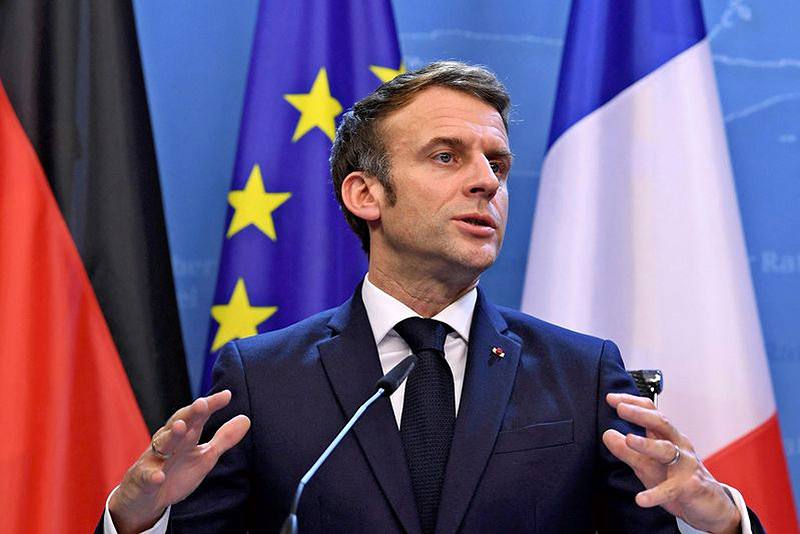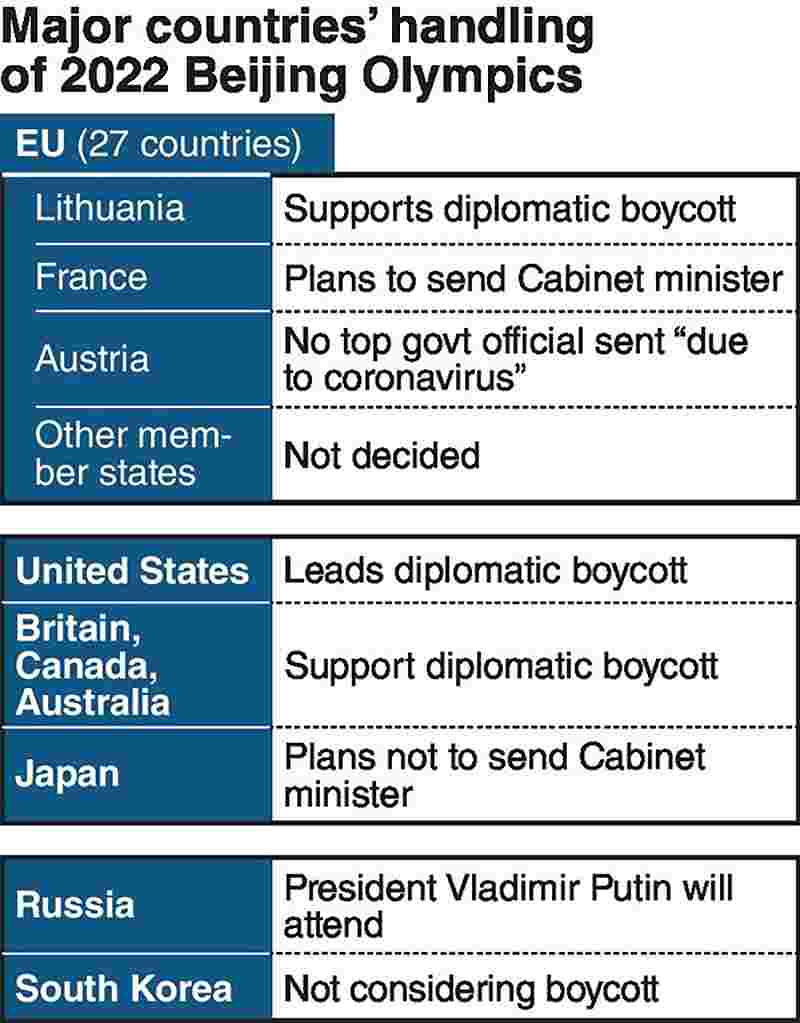
French President Emmanuel Macron addresses a media conference at the conclusion of an EU Summit in Brussels, Belgium on Friday
15:05 JST, December 18, 2021
BRUSSELS/PARIS – EU leaders on Thursday decided not to take the unified action of committing to a diplomatic boycott of the Beijing Winter Olympics to be held in February 2022.
At a summit meeting of leaders of member states, the European Union indicated that it shares the United States’ concerns over human rights issues. However, due to its strong economic ties with China, the EU failed to agree on a unified response.
With just 50 days to go until the 2022 Winter Olympics, only two of the 27 EU member states have taken a clear stance on the issue.
Unofficial negotiations
At the summit held in Brussels, the issue of how to deal with the upcoming Winter Olympics was not on the official agenda but was discussed unofficially. At a press conference after the summit, French President Emmanuel Macron said that EU foreign ministers will discuss the issue again and that the EU will closely examine the situation and decide on the level of response needed.

In July, the European Parliament passed a resolution calling for EU member states to boycott the Olympics unless the human rights issues in the Xinjiang Uygur Autonomous Region and other parts of China are addressed. The resolution is not legally binding and the European Commission, the EU’s executive arm, originally planned to leave the decision to each member state because, according to a senior official at the commission, the EU does not have authority over sports.
However, the Netherlands, which places emphasis on the human rights issues, and other countries proposed to make arrangements within the EU. According to Reuters reports, many countries expressed their hesitation over boycotting the Olympics at the Foreign Affairs Council held on Dec. 13, and Luxembourg’s foreign minister said it would be difficult to build a consensus quickly.
Biggest trade partner
As of Friday, only Lithuania and Austria have taken a clear position on the diplomatic boycott of the Winter Olympics. Lithuania confronts China and has thus kept in step with the United States, which is leading the diplomatic boycott. Austria suggested that its government would not send top government officials to the Olympics, citing measures against the coronavirus as its reason. Most other countries have held off on a decision.
In May, the European Parliament froze the ratification of the EU-China investment deal that is supposed to encourage market entry for both the EU and China. However, China overtook the United States as the EU’s biggest trading partner in 2020 for the first time ever, so many countries do not have a hard-line attitude toward the country.
Italy, which is set to host the 2026 Winter Olympics, is the only Group of Seven member that participates in China’s “One Belt, One Road” economic mega initiative. There are quite a few countries relying on support from China, such as Greece and Hungary, while for economic giant Germany, China is a major export destination for its carmakers, which is Germany’s core industry.
Effect ‘would be small’
France, which will host the 2024 Summer Olympics, claims that this kind of boycott would politicize the Olympics. In 1980, in the midst of the Cold War, the United States and other countries boycotted the Moscow Olympics while France participated. For the upcoming Winter Olympics in Beijing, France is making arrangements to send a Cabinet minister.
In the 1984 Los Angeles Olympics, the Soviet Union did not send its national team to the United States.
However, many believe that these boycotts did not bring about major changes to the attitudes of either the Eastern or Western camps. Macron says that the effects of a diplomatic boycott would be very small.
Top Articles in World
-

Israeli Ambassador to Japan Speaks about Japan’s Role in the Reconstruction of Gaza
-

Videos Plagiarized, Reposted with False Subtitles Claiming ‘Ryukyu Belongs to China’; Anti-China False Information Also Posted in Japan
-

North Korea Possibly Launches Ballistic Missile
-

Chinese Embassy in Japan Reiterates Call for Chinese People to Refrain from Traveling to Japan; Call Comes in Wake of ¥400 Mil. Robbery
-

Pentagon Foresees ‘More Limited’ Role in Deterring North Korea
JN ACCESS RANKING
-

Japan PM Takaichi’s Cabinet Resigns en Masse
-

Japan Institute to Use Domestic Commercial Optical Lattice Clock to Set Japan Standard Time
-

Israeli Ambassador to Japan Speaks about Japan’s Role in the Reconstruction of Gaza
-

Man Infected with Measles Reportedly Dined at Restaurant in Tokyo Station
-

Man Infected with Measles May Have Come in Contact with Many People in Tokyo, Went to Store, Restaurant Around When Symptoms Emerged






















